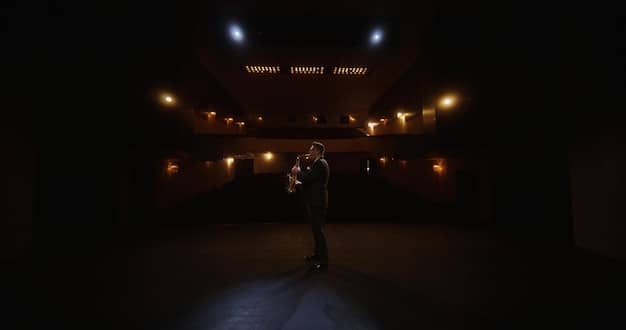The Ethics of Theater Criticism: Objectivity vs. Opinion

The ethics of theater criticism involve navigating the delicate balance between objective analysis and subjective opinion, ensuring fair and insightful evaluations that respect both the art form and the audience. This balance is crucial for maintaining credibility and fostering constructive dialogue within the theater community.
Theater criticism plays a pivotal role in shaping public perception and influencing the success of theatrical productions. However, at the heart of this influential craft lies a complex question: the ethics of theater criticism. How do critics navigate the fine line between offering objective analysis and expressing personal opinions? This question is essential for understanding the value and impact of theater reviews.
The challenge lies in providing insightful commentary that is both informed and fair, contributing to a richer understanding and appreciation of the art form. Let’s explore the key considerations and ethical dilemmas that theater critics face in their pursuit of balanced and responsible reviews.
Understanding The Ethics of Theater Criticism
Theater criticism is more than just a thumbs-up or thumbs-down assessment. It involves a deep understanding of the theatrical arts, including acting, directing, scriptwriting, and set design. The ethics of theater criticism demand that critics approach each performance with an open mind and a willingness to engage with the material on its own terms.
This means setting aside personal biases and preconceived notions to evaluate the production based on its artistic merits and its ability to achieve its intended goals. It also involves acknowledging the hard work and dedication of the artists involved, even when offering constructive criticism.

Objectivity vs. Subjectivity in Theater Reviews
The core tension in theater criticism arises from the inherent subjectivity of artistic taste. While critics must strive for objectivity in their analysis, it’s impossible to completely eliminate personal preferences and opinions. The key is to be transparent about these biases and to clearly distinguish between objective observations and subjective judgments.
Defining Objectivity and Subjectivity
Objectivity in theater criticism refers to the ability to evaluate a production based on established standards and criteria, such as acting technique, directorial vision, and script quality. Subjectivity, on the other hand, involves personal reactions, emotional responses, and individual interpretations of the performance.
Ethical criticism requires critics to acknowledge the role of both objectivity and subjectivity in their reviews, providing readers with a balanced and nuanced assessment of the production.
- Contextual Awareness: Understanding the historical, social, and cultural context of the play.
- Artistic Integrity: Evaluating the production’s faithfulness to the playwright’s intentions.
- Technical Merit: Assessing the quality of the acting, directing, set design, and other technical aspects.
- Audience Impact: Considering how the production is likely to resonate with different audience groups.
Ultimately, the goal is to offer a critique that is both informative and insightful, helping readers make their own informed decisions about whether to see the production.
Maintaining Authoritativeness and Trustworthiness in Reviews
Audiences place trust in critics to provide informed and reliable assessments of theatrical productions. Maintaining this trust requires critics to demonstrate expertise, authority, and integrity in their reviews. The ethics of theater criticism: Balancing objectivity and personal opinion, also means prioritizing truthfulness and accuracy in reporting on theatrical events.
Building Credibility as a Critic
To build credibility, critics must possess a deep understanding of theater history, theory, and practice. They should be familiar with different theatrical styles, genres, and movements, allowing them to provide informed and insightful commentary on a wide range of productions.
Critics should also be transparent about their qualifications and affiliations, disclosing any potential conflicts of interest that could compromise their objectivity.
- Deep Knowledge: Possessing a strong foundation in theater history, theory, and practice.
- Consistent Quality: Consistently producing high-quality reviews that are well-written and insightful.
- Ethical Conduct: Adhering to a strict code of ethics that prioritizes accuracy, fairness, and transparency.
- Conflict Disclosure: Disclosing any potential conflicts of interest that could compromise objectivity.
By demonstrating expertise, authority, and integrity, critics can establish themselves as trusted voices in the theater community and beyond.
The Impact of Criticism on Theatrical Productions
Theater criticism has a significant impact on the success or failure of theatrical productions and the ecosystem as a whole. Positive reviews can boost ticket sales, enhance a production’s reputation, and attract further investment. Negative reviews, on the other hand, can have the opposite effect, leading to empty seats, cancelled performances, and financial losses.
The Power of Words
Because of the potential impact of their words, critics have a responsibility to wield their power with care and consideration. They should strive to offer constructive criticism that is both honest and respectful, avoiding personal attacks and gratuitous negativity.
The relationship between critics and the theatre community relies on critics practicing the ethics of theater criticism.
They play a major role in shaping public opinion and their work should be unbiased, so as to not let their personal opinions come to the forefront above the work they are critiquing.

Challenges in the Current Landscape
The rise of social media, in particular, has had a big impact on arts and culture criticism. With the ability for anyone to be a critic and share their opinions at the click of a button, standards of critique have been lowered. It also creates a conflict of interest when productions and theatres want coverage but rely on the critics opinions to be able to gain customers.
Finding Neutrality in Promotion
Many institutions have begun to rely on their marketing and public relations teams to disseminate art. With the decline of print media and rise of paid social media promotions, it becomes difficult for true, ethical critique to exist.
It is important for publications to follow the ethics of theater criticism and not let marketing dollars sway their opinions.
In order to maintain the ethics of theater criticism it is important to not be swayed by those that have influence, and to be neutral in the evaluation of the work.
Moving Forward in Theater Criticism
As the theatre landscape continues to change and shift, it is important to keep the traditions of quality, reliable sources alive in evaluating the work.
Ensuring Ethical Conduct
In order to ensure ethical conduct is upheld, critics must work to not be influenced by outside sources and let their own experience with the craft inform their critiques. This can include working in the theatre or spending decades as a viewer.
By being an expert in theatre and upholding the standards, it is possible to maintain the importance of the ethics of theater criticism: Balancing objectivity and personal opinion.
| Key Point | Brief Description |
|---|---|
| 🎭 Objectivity | Fair evaluation based on established standards. |
| ✍🏽 Subjectivity | Personal reactions and interpretations. |
| 💯 Credibility | Expertise, authority, integrity. |
| 🗣️ Impact | Significant influence on productions. |
Frequently Asked Questions
Key elements of ethical theater criticism include objectivity, fairness, expertise, and integrity. Critics should strive to provide a balanced assessment of the production, while disclosing any potential conflicts of interest.
Critics can balance personal opinions with objective analysis by clearly distinguishing between subjective judgments and objective observations. Providing a transparent rationale for their opinions helps readers understand the basis for their assessment.
Expertise plays a crucial role in ethical theater criticism by enabling critics to provide informed and insightful commentary on theatrical productions. A deep understanding of theatre history, theory, and practice allows critics to offer nuanced evaluations.
Common pitfalls include personal attacks, gratuitous negativity, and conflicts of interest. Critics should avoid these pitfalls by focusing on the artistic merits of the production and maintaining a fair and objective perspective.
The ethics of theater criticism are essential for maintaining trust and credibility within the theater community. Ethical reviews contribute to a richer understanding and appreciation of the art form, while promoting constructive dialogue.
Conclusion
In conclusion, the ethics of theater criticism require a delicate balance between objective analysis and personal opinion to be fair and valuable for both the arts and fans. As the landscape of media changes, it is important to hold theatre reviewing to a high standard.
By engaging with this topic, writers and fans can ensure the value of the art.





